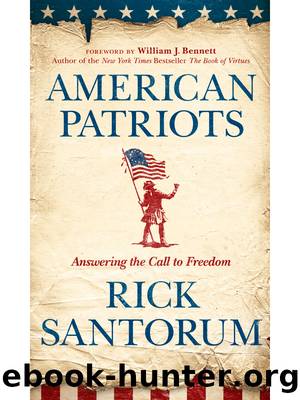American Patriots by Rick Santorum

Author:Rick Santorum [Santorum, Rick]
Language: eng
Format: epub
Tags: Autobiography, Biography, Historical, Revolutionary Period (1775-1800), Politics, 20th Century, Religion
Publisher: Tyndale House Publishers, Inc.
Published: 2012-10-01T23:00:00+00:00
Today’s moviegoers may know Charles Carroll of Carrollton as the dying man in National Treasure who knew about a coded map on the back of the Declaration of Independence and made a late-night trip to the White House to tell President Andrew Jackson about the secret treasure buried in New York City. This story is a fabrication, but the truth about the last surviving signer of the Declaration of Independence is even more compelling.
Charles Carroll of Carrollton had much to lose, but also much to gain, from the American Revolution. Though born into a wealthy, influential family in Annapolis, Maryland, Carroll was not permitted to participate in politics—not even to vote—simply because he was Catholic. Ironically, Maryland had been established with the idea of creating a refuge for English Catholics in the colonies in the midst of religious turmoil in Europe. For many years, this colony offered the most religious freedom for Catholics, but they still faced discrimination.
Catholics were a small minority in America at the time of the Revolution, making up roughly 2 percent of the overall population. The anti-Catholic sentiment in the colonies was rooted primarily in the political antagonism between Protestants and Catholics in Europe, particularly when it came to republican forms of government versus monarchies.
This backdrop makes Carroll’s story all the more remarkable. At the age of eleven, Carroll was sent to Europe for his education. He spent seventeen years abroad at several universities in France, including the Jesuit College at Saint Omer in Flanders and the college Louis le Grand (named for King Louis XIV) in Paris. There he deepened his religious convictions and gained sharp critical thinking skills that made him an invaluable leader when he returned to Maryland in 1765.
He put those skills to good use, aggressively and publicly opposing the Crown’s attempts to tax the colonists without elected representation in the United Kingdom. He also adopted the pseudonym First Citizen in a series of written debates with Daniel Dulany, a scion of one of Maryland’s four ruling families. These debates, published by the Maryland Gazette, served to sharpen Carroll’s thoughts on the proper role of government, even convincing Dulany to agree with him on some of the larger principles. Such powerful arguments coming from Carroll must have surprised many, but it wasn’t long before he was given a respected place among those who asserted their God-given rights against a mother country that both intentionally and unintentionally disregarded them.
Carroll’s leadership became critical during the Annapolis Tea Party of 1774. This event isn’t nearly as well known as the Boston Tea Party the year before, but it reflected an equally fervent opposition to the tea tax demanded by the Crown. Given the combustible situation in the colonies over tea shipments, a British merchant devised a way to sneak a large shipment of tea onto the Peggy Stewart, a vessel headed for Annapolis. When the ship arrived, the merchant’s business partners in the colonies refused to pay the tax on the tea, but none of
Download
This site does not store any files on its server. We only index and link to content provided by other sites. Please contact the content providers to delete copyright contents if any and email us, we'll remove relevant links or contents immediately.
| American Revolution | Civil War |
| US Presidents |
Fanny Burney by Claire Harman(25778)
Empire of the Sikhs by Patwant Singh(22163)
Out of India by Michael Foss(16309)
Leonardo da Vinci by Walter Isaacson(11896)
Small Great Things by Jodi Picoult(6086)
The Six Wives Of Henry VIII (WOMEN IN HISTORY) by Fraser Antonia(4784)
The Wind in My Hair by Masih Alinejad(4420)
The Lonely City by Olivia Laing(4112)
The Crown by Robert Lacey(4099)
A Higher Loyalty: Truth, Lies, and Leadership by James Comey(4026)
The Iron Duke by The Iron Duke(3636)
Millionaire: The Philanderer, Gambler, and Duelist Who Invented Modern Finance by Janet Gleeson(3565)
Sticky Fingers by Joe Hagan(3449)
Alive: The Story of the Andes Survivors by Piers Paul Read(3303)
Papillon (English) by Henri Charrière(3264)
Joan of Arc by Mary Gordon(3253)
Stalin by Stephen Kotkin(3081)
Aleister Crowley: The Biography by Tobias Churton(3015)
Ants Among Elephants by Sujatha Gidla(2920)
